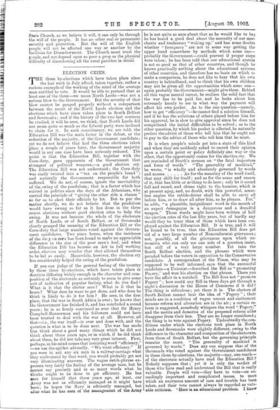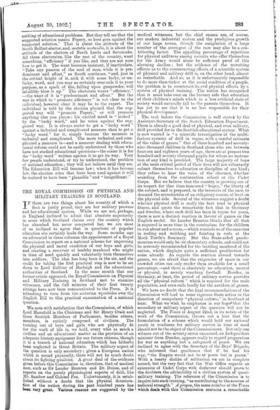ELECTION CRIES. T HE three by-elections which have taken place since
the last week in July afford, taken together, rather a curious example of the working of the mind of the average man entitled to vote. It would be idle to pretend that at least one of the three—we mean North Leeds—was not a serious blow to the Government. But the severity of that blow cannot be gauged properly without a comparison between the result of the North Leeds election and the elections which have since taken place in South Belfast and Sevenoaks; and if the history of the two last contests be studied, it will be seen, we think, that North Leeds did not mean quite so much as the Liberal party were inclined to claim for it. In each constituency, we are told, the Education Bill was the main factor in the defeat, or the reduction of the majority, of the Government candidate; yet we do not believe that had the three elections taken place a couple of years later, the Government majority would in any one case have been seriously reduced. The point is that the Education Bill, together with the Corn-duty, gave opponents of the Government that strongest of political weapons,—a good election cry. The Education Bill was not understood ; the Corn-duty was easily twisted into a " tax on the people's bread " ; and naturally the Government responsible for both suffered. We do not, of course, ignore the inevitability of the swing of the pendulum ; that is a factor which has existed in politics since the days of the Athenians, who carried the principle of " giving the other side a chance " so far as to elect their officials by lot. But to put the matter shortly, we do not believe that the pendulum would have swung so far as it has done in the three recent elections without good election cries to help the swing. It was not because the whole of the electorate of North Leeds, or of South Belfast, or of Sevenoaks clearly grasped the meaning of the Education Bill or the Corn-duty that large numbers voted against the Govern- ment candidates. Two years hence, when the incidence of the duty on corn has been found to make no appreciable difference in the size of the poor man's loaf, and when the Education Bill has become an Act in full working order, electors may wonder that they allowed themselves to be led so easily. Meanwhile, however, the election cry has considerably helped the swing of the pendulum.
If you can judge of the general feeling of the country by these three by-elections, which have taken place in districts differing widely enough in the character and com- position of the electorate as certainly to seem to give some sort of indication of popular feeling, what do you find ? What is it that the elector sees ? What is it that he hears ? What does he want to get done, and who does he think is likely to do it for him ? He sees, in the first place, that the war in South Africa is over ; he knows that the Government has finished it, and has concluded a sound peace ; he is as firmly convinced as ever that Sir Henry Campbell-Bannerman and his followers could not have been trusted to deal with the war at all. However, all that—i.e., the war itself—is over and done with, and the question is what is to be done next. The war has made him think about a good many things which he did not think about three years ago, or in which, if he did think about them, he did not take any very great interest. First, perhaps, in his mind comes that irritating word "efficiency," —we use the epithet advisedly. " We want efficiency." If you were to ask any six men in a railway-carriage what they understand by that word, you would probably get not very illuminating answers. The vague catch-phrase ex- presses very fairly the feeling of the average man, but he cannot say precisely and in so many words what he thinks ought to be done to get efficiency. He has seen for himself that three years ago, at least, our Army was not as efficiently managed as it might have been ; he hopes the Navy is efficiently managed, but after what he has seen of the management of the Army he is not quite so sure about that as he would like to be; he has heard a good deal about the necessity of our mer- chants and tradesmen " waking up," and has some doubts whether " foreigners " are not in some way getting the upper hand somewhere by methods which some one— probably the Government—could -prevent if proper steps were taken ; he has been told that our educational system is not so good as that of other countries, and though he knows practically nothing about the educational systems of other countries, and therefore has no basis on which to make a comparison, he does not like to hear that his own country is behindhand, and to think that his own children may not be given all the opportunities which some one— again probably the Government—might give them. Behind all this vague mental unrest, he realises the solid fact that the war has to be paid for, and he looks about him extremely keenly to see in what way the payment will affect his own pocket. As to the one question—namely, how to get " efficiency "-he cannot find a solution himself, and if he has the solutions of others placed before him for his approval, he is slow to give approval since be does not comprehend the initial difficulties to be solved ; as to the other question, by which his pocket is affected, he naturally prefers the advice of those who tell him that he ought not to pay to the advice of those who tell him that he must.
It is when people's minds get into a state of this kind and when they are suddenly asked to record their opinion upon a certain point or policy definitely one way or the other, that the opportunity comes for the election cry. We are reminded of South's sermon on " the fatal imposture and force of words." "The generality of mankind," he wrote, " is wholly and absolutely governed by words and names As for the meaning of the word itself, that may shift for itself ; and as for the sense and reason of it, that has little or nothing to do here ; only let it sound full and round, and chime right to the humour, which is at present agog, and, no doubt, with this powerful, sense- less engine the rabble-driver shall be able to carry all before him, or to draw all after him, as he pleases. For," he adds, " a plausible, insignificant word in the mouth of an expert demagogue is a dangerous and a dreadful weapon." Those words might have been written of half the election cries of the last fifty years, but of hardly any would they be truer than of those which have been em- ployed against the Education Bill. It is true, and it will be found to be true, that the Education Bill does get rid of a very large number of Nonconformist grievances ; not, possibly, of all the grievances upon which ex- tremists who can only see one side of a question insist, but still of a very large number. Yet take the South Belfast election, and the phrases which were paraded before the voters in opposition to the Conservative candidate. A correspondent of the Times, who may be supposed to be well informed, says that the successful candidate—a Unionist—described the Bill as " promoting Popery," and won his election on that phrase. There you have the affair in a nutshell. The Bill does not " promote Popery " ; how could any Bill in these days get through a night's discussion in the House of Commons if it did ? The thing is ridiculous ; yet there it is. The electors of South Belfast cannot bear the idea of "Popery " ; their minds are in a condition of vague unrest and excitement because reform and alteration are in the air ; a certain re- form is suggested, somebody whispers the word " Popery," and the merits and demerits of the proposed reform alike disappear from their ken. They are no longer considered; the thing is to Vote against Popery. Undoubtedly the con- ditions under which the elections took place in North Leeds and Sevenoaks were slightly different, owing to the difference in the character and composition of the electorate, from those of South Belfast, but the governing principle remains the same. " The generality of mankind is governed by words." Does any one suppose that of the thousands who voted against the Government candidates in these three by-elections, the majority—nay, one-tenth- of the electorate actually have read the Education Bill ? Nobody supposes that ; yet it is only the verdict of those who have read and understood the Bill that is really valuable. People will vote—they have to vote—on ex- ceedingly important and complicated issues, to meet which an enormous amount of care and trouble has been taken, and their vote cannot always be regarded as valu- able criticism. Here is an educational problem. I know nothing of educational problems. But they tell me that the suggested solution means Popery, so here goes against the suggested solution.' That is about the attitude of the South Belfast elector, and, mutatis mutanclii, it is about the attitude of the electors of North Leeds and Sevenoaks. All three electorates, like the rest of the country, want something, "efficiency " if you like, and they are not sure bow to get it. The want becomes insistent, if inarticulate. ,‘ Take any passion of the soul of man, while it is pre- dominant and afloat," as South continues, "and, just in the critical height of it, nick it with some lucky, or un- lucky, word, and you may as certainly over-rule it to your purpose, as a spark of fire, falling upon gunpowder, will infallibly blow it up." The electorate wants " efficiency," —the want of it is " predominant and afloat." But the way in which to " promote efficiency " is not clear to the individual, however clear it may be to the expert. The individual is told by the election placard that the sug- gested way will " promote Popery," or will promote anything else you please : his excited mind is " nicked " by the " lucky word," and he votes against the sug- gested way. It is always easier to get a ‘‘ lucky word" against a technical and complicated measure than to get a " lucky word " for it, simply because the measure is technical and complicated. The more technical and com- plicated a measure is—and a measure dealing with educa- tional reform could not be easily understood by those who have not studied educational questions—the easier it is for the " lucky word " written against it to get its way. Very few people understand, or try to understand, the problem of national education ; they will not believe until they see. The Education Bill will become law ; when it has become law, the election cries that have been used against it will be realised to have been " plausible " and " insignificant."







































 Previous page
Previous page